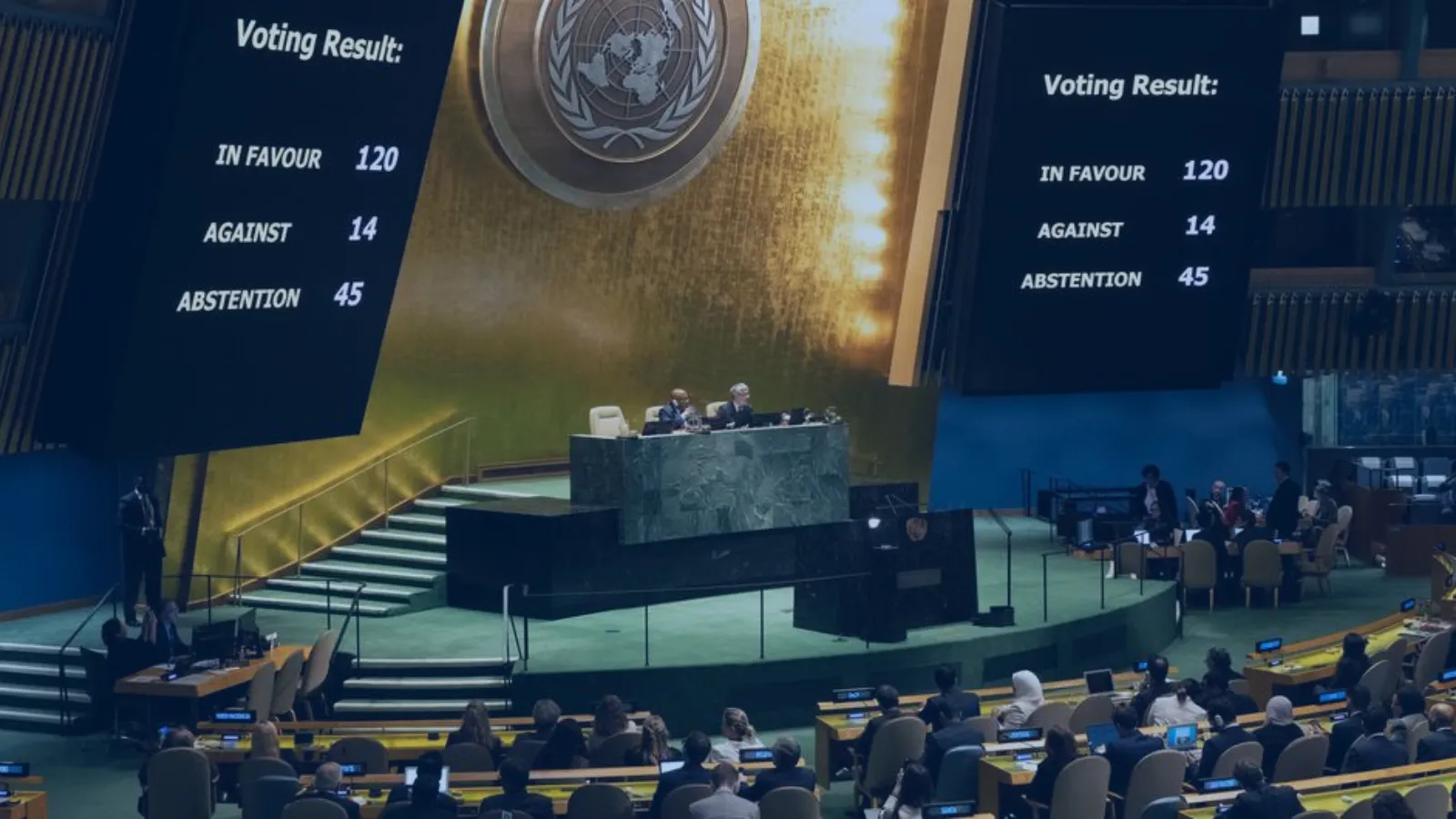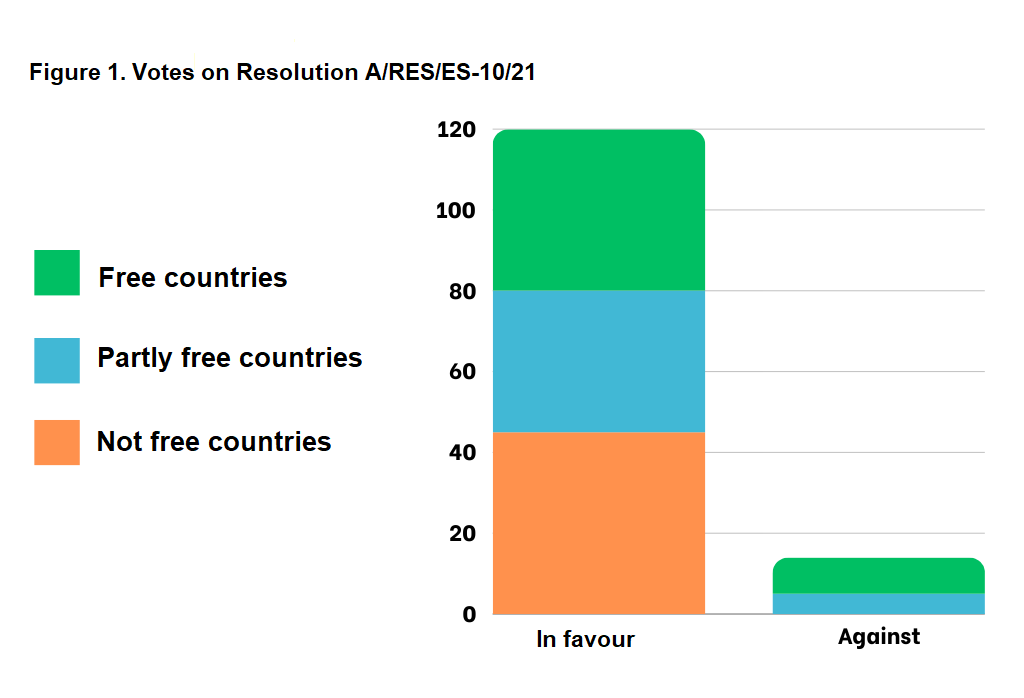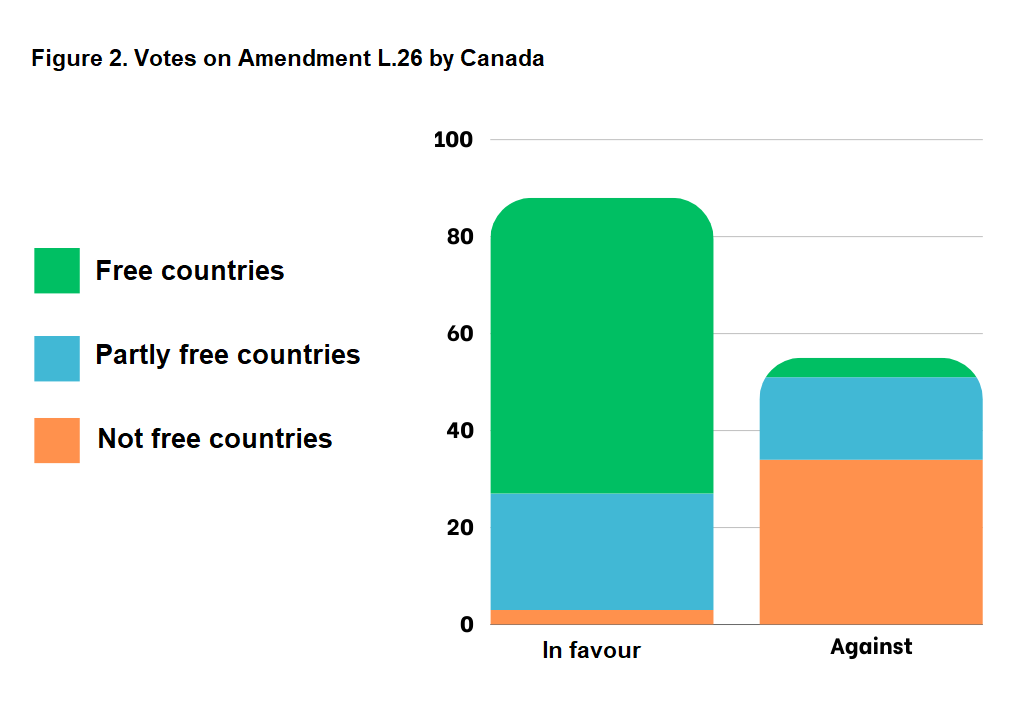Can the UN General Assembly bring lasting peace in the Middle East?

Disclaimer: Opinions expressed in this commentary are those of the author and do not necessarily represent the institutional position of International IDEA, its Board of Advisers or its Council of Member States.
The purpose of the United Nations (UN), as defined in the UN Charter, is to promote peace and security, and avoid the occurrence of a Third World War. Many mechanisms are put in place in the work of the UN and its bodies that help strengthen international peace. One of the mechanisms, adopted in 1950, is the 377 (V) Uniting for Peace Resolution (U4P) that gave rise to the Emergency Special Sessions (ESS) of the UN General Assembly (UNGA). Since then, there have been 11 ESS under U4P, of which 5 were concerning Middle Eastern conflicts involving Israel and Palestine, including the 10th ESS that resumed in October 2023 after being adjourned for five years. Can this new round of ESS help to bring lasting peace to the region?
The obstacles to this are formidable. Resolutions passed under ESS are not legally binding but merely ‘recommendations’, as the UNGA is not meant to substitute the Security Council. These recommendations may include collective actions, including the use of force, but the resolutions themselves are not above the rules and procedures of the UN Charter. Being legally hamstrung, the main use of those resolutions is, in some ways, as a gauge of global political attitudes and fault lines with regard to the issues under discussion. The recent resolutions adopted by the 10th ESS are an example of this. They have showcased one of the factors that has further limited the effectiveness of these resolutions in the case of Israel and Palestine, namely their failure to explicitly acknowledge and condemn any kind of violence inflicted by groups on Israeli civilians. This failure shows telling political patterns, with authoritarian countries being far less likely to condemn and name the perpetrators responsible for any damage inflicted on Israel.
The 10th ESS reopened on 26 October 2023 due to the humanitarian situation in Gaza following Israel’s response to the attack launched by Hamas on 7 October 2023 that killed more than 1,200 people in Israel, forced thousands to flee their homes, and abducted an additional 240 hostages—a majority of civilians, many of whom were women, children and Holocaust survivors. The UNGA reconvened this session due to failed attempts at the adoption of resolutions by the UNSC on the situation in Gaza—which has reached a death toll of over 25,000 people, including women, children and refugees, and has left hundreds of thousands internally displaced—and on the condemnation of Hamas’ actions against the Israeli civilian population. To this date, the UNGA has adopted two resolutions on the protection of civilians and the upholding of legal and humanitarian obligations in the Gaza Strip since the beginning of the 2023 Israel-Hamas war. This ESS has also rejected three amendments proposed by Austria, Canada and the United States on the inclusion of a paragraph to condemn the actions of Hamas on 7 October 2023.
The first resolution in 2023 (A/RES/ES-10/21) put forth by the Arab Group expressed grave concern on the escalation of violence in the region and called for the immediate cessation of hostilities to allow for humanitarian access to those affected by the war. This resolution was adopted with 120 votes in favour, 14 against and 45 abstentions. The high number of abstentions is due to the rejection of a proposed amendment by Canada (A/RES/ES-10/L.26) that requested the following paragraph to be inserted in the original resolution:
"Unequivocally rejects and condemns the terrorist attacks by Hamas that took place in Israel starting on 7 October 2023 and the taking of hostages, demands the safety, well-being and humane treatment of the hostages in compliance with international law, and calls for their immediate and unconditional release."
With the majority of countries laudably voting in favour of humanitarian assistance in Gaza, which aims at protecting civilians, can the same occur when condemning terrorist attacks against Israel and its own civilian population? There seems to be a divide between the way democracies and hybrid/authoritarian regimes see the situation in the Middle East. The following analysis provides an overview of voting patterns according to regime type on recent UNGA ESS resolutions on the situation in Gaza. However, it must be acknowledged that other factors including geopolitics, regional groups, ethnic and religious composition of the population, and other variables may also play a role in the outcome of these voting patterns. These additional factors are not addressed in this article.
Assessing the first resolution passed in 2023 shows that there is a balance in how free, partly free, and not-free countries voted on the humanitarian situation in Gaza (Figure 1). The assessment of the freedom of each country is based on the Freedom in the World data, which uses an overall score of political rights and civil liberties to determine the status of 195 countries and 15 territories in the world.
This assessment is comparable to International IDEA’s definition of democracy as a political system that is based on principles of popular control over decision-making and political equality among those exercising that control. Therefore, the freer the countries, the more likely they are to be democracies. Based on this definition, resolution A/RES/ES-10/21 was adopted by 48 per cent of the free countries, including Barbados, Brazil, Norway and Timor-Leste; 66 per cent of the partly-free countries, including Bolivia, Indonesia and Singapore; and 79 per cent of the not-free countries, including China, Iran, Nicaragua and Türkiye. For any resolution to pass in the General Assembly, two-thirds of the valid votes, which includes votes in favour and against, must be in favour.

The amendment, as proposed by Canada, had a large discrepancy between the countries that voted for the inclusion of the paragraph condemning and naming Hamas. In total, 73 per cent of the free countries, including Chile, Germany, Ghana and the USA; 45 per cent of the partly-free countries, including Mexico, Nigeria and the Philippines; and only 5 per cent of the not-free countries, including Haiti, Myanmar and South Sudan voted in favour of the amendment. In contrast, 60 per cent of the not-free countries, including Egypt, Qatar, Russia and Somalia; 32 per cent of the partly-free countries, including the Maldives, Pakistan and Tunisia; and only 5 per cent of the free countries, including Belize, Guyana, Namibia and South Africa, voted against the amendment, which was not adopted by the UNGA (Figure 2). A similar pattern occurred with the resolution adopted in December 2023 and its two amendments proposed by Austria and the USA. In other words, democracies are far more likely to be evenhanded in the treatment of violence in Israel and Palestine.

This is not new. Throughout the history of the ESS of the UNGA, four sessions were exclusively devoted to the actions of Israel against Palestine, and no resolutions have ever been put forward on the aggression committed against Israeli civilians. If we look at the history of the 10th ESS, a total of 21 resolutions, apart from the Credentials Committee, have been adopted condemning the actions of Israel against Palestinian territory and very few had any mention of the violence incurred on Israel. The first resolution of this ESS called for the condemnation of the construction of a new settlement by Israel in the occupied Palestinian territories, particularly in Jebel Abu Ghneim, an area southeast of Jerusalem, as well as the protection of civilian persons in the time of war. This resolution was adopted by 134 votes in favour, 3 against and 11 abstentions on 25 April 1997, but despite having the majority of the votes in the General Assembly, it did not succeed in its recommendations to the parties involved. Israel claimed in its remarks to the UNGA that direct negotiations had been and would continue to be the only viable and effective solution to the problems of the region and that the 10th ESS with its resolution would not only fail to contribute to the peace process in the Middle East, but that it had also failed to include any reference to the violence committed against Israel during that time. This first resolution contained only one general operative paragraph rejecting terrorism in all its forms, but not specifically against Israel, whereas actions that Israel took against Palestine were mentioned across the document.
This pattern would repeat itself numerous times since, with the General Assembly condemning Israel for different reasons—ranging from the proliferation of settlements on occupied territory to the construction of a wall in East Jerusalem—and Israel refusing to comply with the resolutions on the same grounds mentioned in 1997. Despite the repeated requests by a few Member States over the years to include additional paragraphs to also condemn the actions and violence against Israel and its civilian population, particularly from Hamas in Gaza, these requests were met in vain when amendments were presented to the UNGA. Only three resolutions have also called upon the Palestinian Authority to take immediate and sustained action to bring an end to violence, including the firing of rockets on Israeli territory. However, no resolutions put forward have ever named Hamas as an agent of violence and terror against Israeli civilians. Collective blindness to violence against Israel—particularly on the part of authoritarian regimes—has doomed the whole ESS mechanism to failure. It should be added that, in the case of the events of 7 October 2023, this has happened despite clear evidence that war crimes were committed by Hamas in Israeli territory.
Without acknowledgment by Member States of the violence inflicted on Israel, and the lack of agreement by both parties involved on what the partition of the country should be (Resolution 181 of 1947), it is improbable that any resolution under the 10th ESS, will be able to help bring peace and security to the region. If further ESSs take place without more factual paragraphs that condemn actions taken by both sides, with regards to Israel and Palestine, the UN may continue to be a place where democracies and authoritarian regimes clash with one another instead of being a place for diplomacy to succeed at what it was meant to avoid—the scourge of war and the loss of innocent lives.




